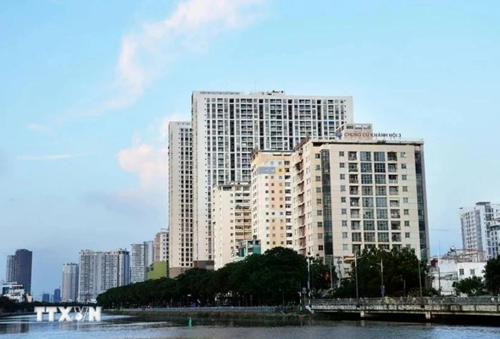Delivering the resolution proposal, Minister of Construction Tran Hong Minh highlighted the necessity of the resolution, which is expected to accelerate the progress and shorten investment and construction time for social housing projects by providing a sufficient, comprehensive, and consistent legal framework to remove obstacles to social housing construction and development.
The resolution aims to create more favorable mechanisms to attract businesses' investment in the construction of social housing and promote the development of this type of accommodation.
    |
 |
|
A building for low-income earners in Ho Chi Minh City's District 4 |
At the same time, it is hoped to have a dual impact – helping low-income citizens access affordable housing as part of the plan on building at least 1 million social housing units for low-income earners and industrial park workers during 2021-2030; and balancing supply and demand, adjusting the structure of real estate products, and consequently lowering commercial housing prices, thus helping the real estate market to grow more stably and healthily.
According to the official, the draft includes a proposal to establish a national housing fund aimed at supporting the development of social housing in Vietnam.
The fund will be a State-owned financial entity operating outside the state budget, and established at both central and local levels. It will be financed through state budget allocations, voluntary contributions from organizations and individuals, proceeds from land-use rights, sales of public housing assets, and other legal sources.
The fund's primary function will be to invest in and develop housing projects, including rental and hire-purchase options, for low-income individuals, civil servants, public employees, and workers.
Minister Minh emphasized that Vietnam currently lacks a national housing fund or a suitable financial institution providing financial support for long-term and sustainable social housing projects. Existing housing development funds of localities have limited capital, so most of them have been merged into local development investment funds.
The proposal has received support from the N.A. Committee on Legal and Judicial Affairs, the verification agency of the draft. However, the committee recommends clarifying the fund's legal status and organizational structure, as well as its eligibility to act as a project investor under the Housing Law and related ones.
The Government also proposed several special mechanisms to facilitate social housing development, including approving investment policies and assigning investors to develop social housing without using public investment capital or bidding. Additionally, it suggests eliminating the requirement for feasibility study reports by specialized agencies, expected to reduce project timelines by 15 to 35 days.
Chairman of the N.A. Committee on Legal and Judicial Affairs Hoang Thanh Tung pointed out the need to review regulations on special policies regarding investment policy approval to ensure they are appropriate to investment resources.
The verification body also recommended reviewing and refining the conditions for assigning project investors to build housing for members of the people’s armed forces, ensuring that the regulations are comprehensive and inclusive. Additionally, it suggested further clarifying the criteria for selecting investors to ensure fairness and objectivity.
Source: VNA